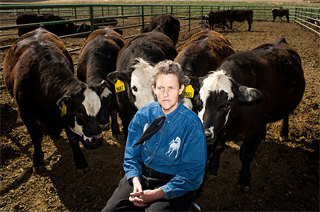 With esteemed professor, best-selling author and well-known autistic activist Temple Grandin coming to the Mondavi Center on Feb. 10, UC Davis is hoping to shed some light on the lives of individuals in the community who identify with the autism spectrum.
With esteemed professor, best-selling author and well-known autistic activist Temple Grandin coming to the Mondavi Center on Feb. 10, UC Davis is hoping to shed some light on the lives of individuals in the community who identify with the autism spectrum.
“[Autistic students and autism research] is important for a lot of reasons,” said David Amaral, a UC Davis psychiatry professor and research director at the Medical Investigation of Neurodevelopmental Disorders (MIND) Institute. “Many of the students are actually some of the smartest students at a university setting. They have the skills that will allow them to be very creative, particularly in areas such as engineering or mathematics, and it’s the community’s responsibility to try and find settings where they can feel fulfilled [and] use their skills but also not jeopardize their emotional life.”
According to the Autism Speaks website, autism spectrum disorder (ASD) is a general term for a group of complex brain development disorders, specifically causing difficulty in social interaction and communication as well as repetitive behaviors.
UC Davis’ MIND institute conducts groundbreaking research with regards to autism spectrum disorders, fragile X syndrome and other neurodevelopmental disorders. Amaral has been a part of the institute since its start in 1998, and has been instrumental in many projects, particularly the Autism Phenome Project.
“The Autism Phenome Project is trying to gather information on a large number of kids who have autism to divide it up into more homogeneous subtypes,” Amaral said. “Autism is really complex and heterogeneous, and none of the treatments other than behavior therapy seem to work. We’ve already seen 300 families to try and study their children and study their environment to figure out what differentiates the different types of autism.”
Meetings with these 300 families allowed Amaral and his associates to conduct completely benign magnetic resonance imaging on the brains of these children after they had gone to sleep. These images gave researchers at the MIND Institute the opportunity to examine the differences between a child with autism’s brain compared to a typically developing child.
Second-year international relations and psychology double major Riley Sims has been interested in working in the field of special education for many years, and currently works as a special needs aid at the local YMCA.
“I’ve always been interested in [autism] — I feel like I could help make a difference in people’s lives,” Sims said. “Autism is very prominent in society today and the more we know about it, the better we’ll be able to address it. There’s so much we know about it but there’s even more that’s still to be researched and discovered.”
Sims said she is interested in becoming an advocate for those with special needs, and is also looking at careers in the field of occupational therapy. Another form of therapy especially prevalent in treating children with autism is behavior therapy.
“Because of behavior therapy, more and more kids who have a diagnosis of autism early on actually lose the diagnosis as they get older; you might even say they were
‘cured,’” Amaral said. “Now as adolescents and adults, [some of] those kids still have problems, and a lot of the problems [have to do with] social awkwardness. Once an individual has autism and gets into complicated social situations – which often happens in school – they really don’t know how to navigate through them and often misinterpret it. They may do something that looks as if they are being unfriendly or unkind, but it’s just part of their personality.”
Since one percent of the population is diagnosed as being on the autism spectrum, Amaral said that universities are going to have to start to seriously consider establishing social skills training programs within the healthcare system.
“[Autism research] is important because it directly benefits people who have autism — it helps them to know what kinds of treatments or therapies they should pursue,” Sims said. “It also helps researchers know what to expect with certain disorders. The more we know, the better we’re able to implement practices that 1, prevent these disorders or syndromes from occurring and 2, better address them so we can tackle them at an earlier onset, because the earlier we address the issue the better we can beat it.”
For the 2014-15 school year, the Campus Community Book Program (CCBP) chose Temple Grandin’s Thinking in Pictures: My Life with Autism to promote discussion with regards to the topic of autism. Administrator of Diversity Education and Chair of CCBP Mikael Villalobos has been key in developing the dialogue between students and those in the Davis community with regards to Grandin’s book.
“Our office is responsible for coming up with the program related to and supporting the book,” Villalobos said. “The theme this year is disability issues, and that’s what led to the selection of [Grandin’s] book. Given that [Grandin] is someone who identifies as an autistic person, a lot of events have been surrounding the autistic community.”
A meet the author event is scheduled to happen at the Mondavi Center tonight, and is split into two parts: a panel discussion about “the Line Between a Difference and a Disability” at 4 p.m. which is free to the public, and the “Author’s Talk” at 8 p.m.
“I think [Grandin] is a good example of a really positive outcome, but also she is a person who still has quite a few difficulties,” Amaral said. “As wonderful and productive as she’s been, she still suffers from anxiety and other issues. So it speaks to the issue of what’s possible with the diagnosis of autism, but it also speaks to the issue that research is really still very essential to figuring out what’s causing all of her struggles.”
Courtesy www.vetmed.ucdavis.edu.



